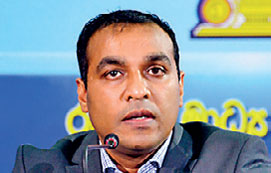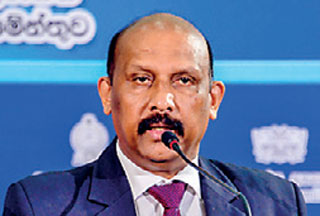Monday Feb 16, 2026
Monday Feb 16, 2026
Tuesday, 27 September 2022 00:53 - - {{hitsCtrl.values.hits}}
 |
| Acting Defence Minister Pramitha Bandara Tennakoon |
 |
| Defence Secretary General (Retd.) Kamal Gunaratne
|
Under fire from social and political activists, the Government yesterday defended its decision to declare several key locations in Colombo as high-security zones, insisting the move is aimed to ensure stability and not curbing freedom of expression.
“Security establishment will take legal measures to stop or prevent illegal demonstrations that obstruct everyday life and create a sense of chaos in the country,” Acting Defence Minister Premitha Bandara Tennakoon told journalists.
He made these remarks at a special media briefing organised by the Government Information Department to explain the rationale for recently announced high-security zones and the use of force against unlawful protests.
Noting that the Government accepts and respects the people’s right to protest, Tennakoon emphasised, prior approval must be obtained from the security establishment at least six hours before a protest march or demonstration as per the law.
Last Friday, the Government issued an Extraordinary Gazette declaring several areas as high-security zones in the Colombo district.
These high-security zones include; the Parliament, Supreme Court, High Court and Magistrate Court in Colombo, Attorney General’s Department, Presidential Secretariat, President’s House, headquarters of the Navy, Air Force and Police, Ministry of Defence, Sri Lanka Army headquarters in Akuregoda, Prime Minister’s Office, Temple Trees, Official Residences of Defence Secretaries and Commanders of Tri- Forces and IGP.
The related Gazette notification was issued on 16 September with the signature of President Ranil Wickremesinghe, who is also the Defence Minister.
A day after the Gazette issued declaring high-security zones, Sri Lanka police arrested 84 people including three monks and four women citing it as an illegal protest in Colombo organised without permission.
The Government came under harsh criticism from opposition lawmakers and activists for what they claimed is the most recent episode in a heavy-handed crackdown on anti-Government protests.
“The Police must be informed about any protest six hours ahead and if permission is obtained only, they can continue without any issues. None of the protests that were held recently was not following that law,” Tennakoon said.
Defence Ministry Secretary General (Retd.) Kamal Gunaratne said high-security zones are nothing new, defending the controversial return to war-time high-security zones in the capital Colombo.
“We saw how the Presidential Secretariat came to be surrounded by groups recently. They blocked officials from functioning. If the main place where key decisions are made is blocked, we have to take decisions to prevent it,” he added.
He also claimed the ‘Agitation Site’ introduced by former President Gotabaya Rajapaksa was in the wrong place.
“We have understood that the Agitation Site was declared in the wrong place. Many accommodation sites used by Foreign Envoys are located in this particular area,” Defence Secretary added.